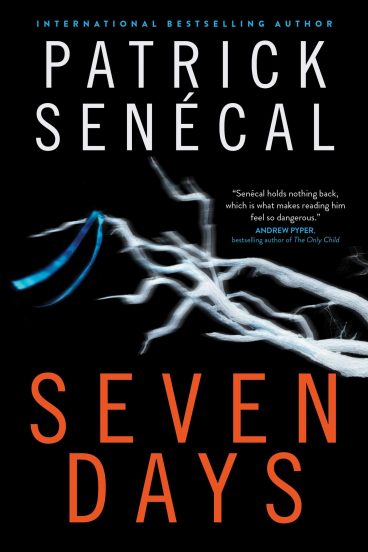 By PATRICK SENECAL (Simon & Schuster; 2001/19)
By PATRICK SENECAL (Simon & Schuster; 2001/19)
The second English language translation of the writing of Quebec’s Patrick Senecal. Hugely popular in his native land, Senecal deserves to be better known in ours—although SEVEN DAYS probably isn’t the best place to start.
The first Senecal book to appear in English was AGAINST GOD in 2012. That novel was a sharp and horrific exploration of the corrosive effects of grief, a description that also sums up SEVEN DAYS. It pivots on Bruno Hamel, a contented surgeon whose life is shattered by the torture-murder of his young daughter. It doesn’t take the police long to track down the perpetrator, who Bruno becomes determined to make pay for his crimes.
Utilizing an extremely careful and precise methodology, Bruno kidnaps “the monster” from police custody and takes him to a secluded cottage. There he subjects his captive to a seven day torture-thon, at the end of which Bruno plans to kill the monster and then turn himself in to police.
Given that Senecal is acclaimed on the blurb page for “taking us very far into the pit of madness” and leading readers “into an unsettled state,” and that the 2010 film adapted from this novel is a key entry in the so-called torture porn cycle, it shouldn’t come as any surprise that a great deal of inventive grotesquerie is contained in these pages. From the unholy surgical modifications wreaked on the monster to a deeply upsetting flashback of a dog being beaten to death, the range of nastiness on display here is formidable.
Decidedly less formidable are the abundance of clichés, most glaringly the middle-aged police inspector whose investigation into Bruno’s actions is interspaced with the torture, and the dog whimpering Bruno constantly hears (directly related, as you’ve probably guessed, to the abovementioned canine killing)—not quite a “Tell-Tale Heart,” but close. Plausibility, or lack thereof, is another issue (how is it that the police inspector deliberately uses the mother of one of the child molester’s victims to bait Bruno yet doesn’t think to assign her any protection?), as is an abundance of purple prose (“He was saving his emotions for later…when hate and joy would be joined in a most devastating marriage”).
Yet there’s a reason Senecal has become so revered. His storytelling instincts are quite strong, resulting in a page-turner whose moral implications are provocative, to say the least. The fact that Bruno’s victim is indeed every inch the “monster” Bruno insists on identifying him as is not lost on Senecal. Nor is the public furor that would no doubt result from Bruno’s actions, with demonstrations in favor of and opposition to him shaking the nation—one of the rare elements of SEVEN DAYS that feels entirely convincing.
So Senecal knows how to spin a gripping and thought-provoking yarn without question. I just wish that in this particular case the raw material was a bit stronger.
